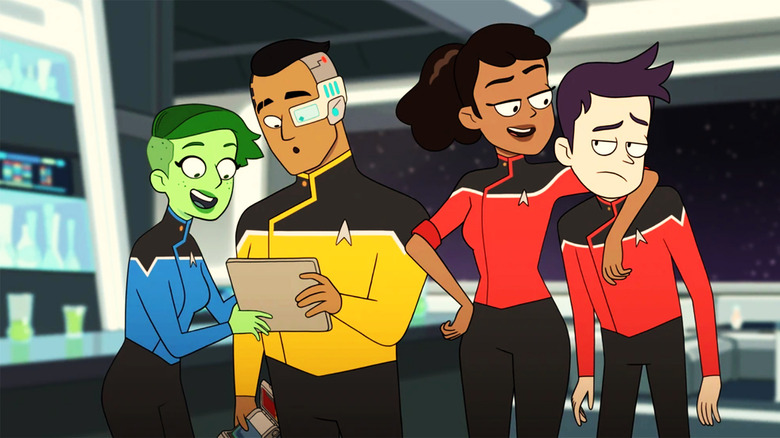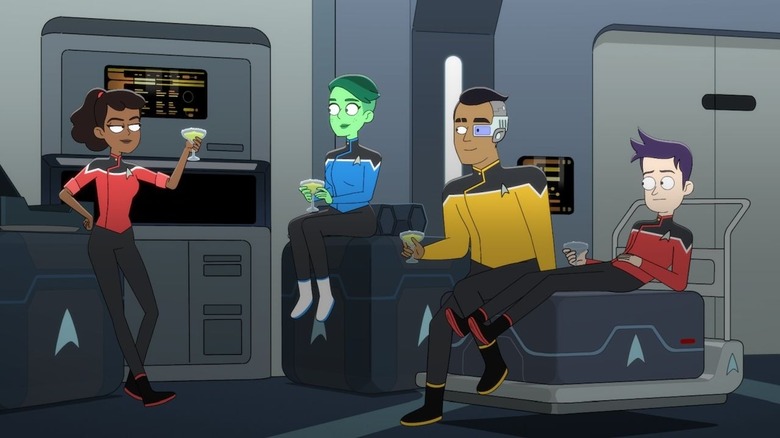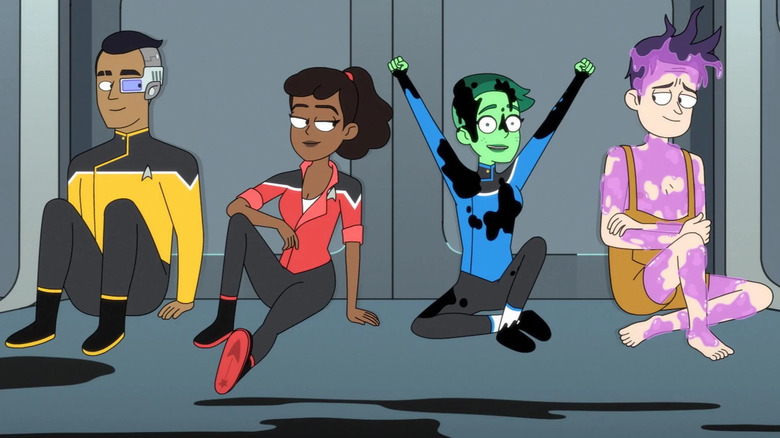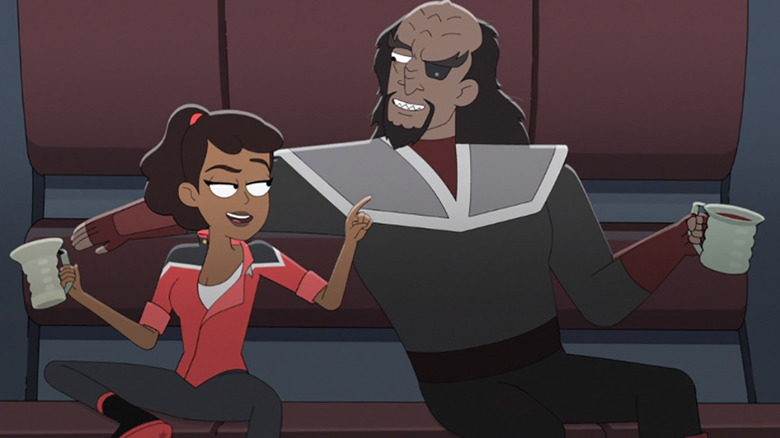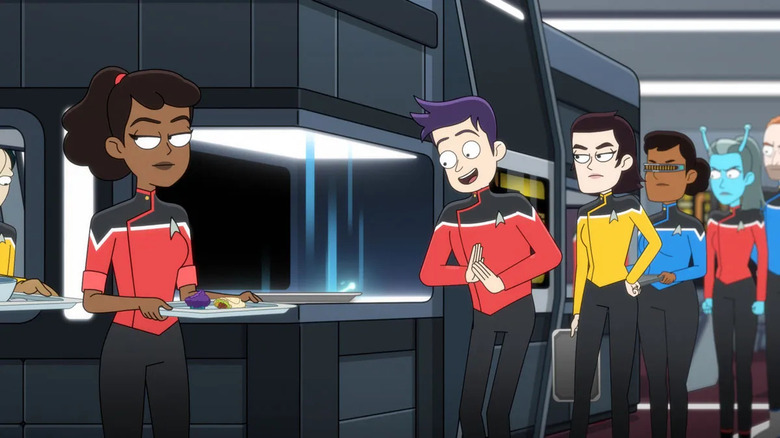Star Trek: Lower Decks Creator Mike McMahan Digs Into The Textures Of Trek [Interview]
Making an animated workplace comedy set in the "Star Trek" universe is no easy feat, but somehow the team behind "Star Trek: Lower Decks" made it look easy. The series is both a fantastic animated adult comedy and a truly great "Star Trek" series, mixing irreverent humor with a whole lot of love for the shows that have come before. "Lower Decks" follows the crew of the U.S.S. Cerritos, specifically the lower deckers who are just starting out in their Starfleet careers. If you ever wondered what it would be like serving in Starfleet and surviving as a fledgling officer, "Lower Decks" is for you.
The series' second season is coming out on Blu-ray and DVD on July 12, 2022, and season 3 should premiere sometime this year on Paramount+. To celebrate the home video release of season 2, I spoke with series creator Mike McMahan and asked him about his own "lower decker" experiences, potential pushback from Paramount, and Klingon acid punk.
Note: This interview was conducted one day before an allegation was made against McMahan regarding his purported behavior in the writers' room of another animated series, "Solar Opposites." If we had known about that allegation when this interview was conducted, we would have asked him about it.
This interview has been lightly edited for clarity.
'Wait. We're just writing real Star Trek right now'
The show really balances reverence and fan service with a lot of irreverence and poking fun. Are there any jokes that you cut because you realized it was mocking "Star Trek" instead of laughing with it? And how do you define that boundary?
That's the big question all the time on this show, is balance. We're always talking about the balance. [...] We're all comedy writers and we're used to like ... just the joke wins. The funniest joke wins. The funniest idea wins. And in this, it's always like, not only "Does it still feel like 'Star Trek?' but a lot of the time we're balancing "Does it feel like 'Lower Decks?'" Like, we'll get far down the line on a story idea and then be like, "Wait. We're just writing real 'Star Trek' right now. Right? Like what if — why is this a 'Lower Decks' thing? How does this speak to our characters, the time in their lives that they're in? How is it inspired by things that you experienced when you were in your 20s and having kind of like achieved everything you wanted to get, advice you have, and it's frustrating, and there were threshold guardians, and obstacles, and unexpected setbacks, and all that kind of stuff?"
So it's just hard to give — we're always trying to be funny. It's very helpful that Tawny [Newsome] and Jack [Quaid], Noël [Wells] and all of our voice actors are so funny. And if we give them something funny, they're going to make it better. But we're constantly trying to make it so that at the end of an episode, one person might say, "Wow, that was really funny. I love that." Somebody else would say, "Yeah, but it was also like a real 'Star Trek' episode." And if we get that, then we're doing what I wanted to accomplish.
'Those friends that you make, that's what these stories are about'
"Lower Decks" is really relatable to anyone who ever has had like a real life, "lower decks"-type job in retail or customer service or bartending, whatever. Did you have any early jobs that inspired the day-to-day grind experienced by the Ensign crew?
I did. I mean, not as bad as some people. I was pretty lucky. I used to work like in some bars in Chicago. I used to work in Second City, but not on stage. I would set up the room, and if there was somebody who got too drunk, I'd have to ask them to leave. And clean up the theater. You'd be surprised what people bring to a comedy show. "Oh, there's newspapers under this chair, gum in them, whatever." And then in Los Angeles, I worked as a production assistant on a couple shows, which is not glamorous work. It's sometimes like shoveling actual garbage and driving for nine hours straight. And then I was an assistant for a number of years, too. When I was trying to become a writer, there was the writers' strike. Jobs got shut down.
You do whatever you can do to make ends meet. I've done a lot of jobs that maybe aren't fun, but I know that no matter what I was doing, whether it was cleaning up the trash or dealing with drunks in a theater, every one of those jobs was seen with other people doing the same job as I was and making friends for life at those jobs. And I say this to new writers that I meet. And I'm like, "Listen, nobody remembers if you were the best at picking up a cup of coffee. They remember if you were a joy to be around. You were expected to be there. All they remember is if you're a trustworthy person and does a pretty good job." You keep finding these people in your life while you're working jobs that maybe aren't what you want to do. It's what you have to do. But those friends that you make, that's what these stories are about. And that's kind of what we try to say in "Lower Decks."
'There's this thing about Star Trek that's so palatable and so broad'
One of the fun things about "Lower Decks" is just how jam-packed with jokes and references. Every single episode is forcing fans to think about new ideas in the world of "Star Trek." Like Klingon acid punk as a music genre. Is there any small bit you wished that you'd gotten to take further or you want to return to in the future?
Well, luckily we're writing season 4 right now. You guys are about to see it. So you'll see that, yeah. There's a lot of stuff that I want to build on. And Klingon acid punk ... there's this thing about "Star Trek" that's so palatable and so broad. There's a reason it works, that so many audiences, whether you're a man or a woman, or a kid or an adult, or anything, whatever your background is. It speaks to so many people. It's about respect. And it's about truth and respecting people of different backgrounds, but it's also, "Look, we're going to a planet and it's very monocultural. Here's where the Klingons live. They're all like that." Right?
But now we've got 700 episodes. We've met Worf. We've met B'Elanna. It's different. And so as they build out those monocultures into something that's more textured, that's what I like to do about it. I like to be like, "Okay. Let's take Exocomp. We saw them in one episode. What if we started to build them out? Like, where could they have gone? What are more textures of them?" And actually, you'll see some of that in season 3. And even if we're writing season 4, there are some major "Star Trek" planets where I'm like, "Let's go there. We've never been there. Let's check this out. Let's see what it's like." Getting to do that but still telling stories about likable, fun, respectful, science-driven Starfleet officers, kind of like you get to write real "Star Trek" while having fun and telling a story while you're doing it. It's just a blast.
'It's all about that balance'
Have you ever gotten any pushback from Paramount on any jokes? Did anything go too far for standards and practices?
It's so funny, because I had other shows where literally I got pushed back every episode about multiple things. We're so careful on the horror side ... like on any side. I don't think that there's anything ... even as I'm saying it, I'm like, "Well..." There was one thing they were worried about. There's a bit of a romantic scene between two bridge officers on the Holodeck. And they got a little worried about how we were going to present it, but we do it in a tasteful way. So it's all about that balance.
Between this and "Solar Opposites," you're pretty busy with funny, animated sci-fi shows. What do you think would happen if the Cerritos somehow encountered Korvos and Yumyulack?
Let me see. If the Solar Opposites ended up meeting Korvos and Yumyulack, I think they would be blown away by how respectful and careful the Cerritos crew was. And then the Solar Opposites would break a bunch of their stuff, and they would get thrown off the ship.
"Star Trek: Lower Decks" is available to stream on Paramount+, and is coming to Blu-ray and DVD on July 12, 2022.
